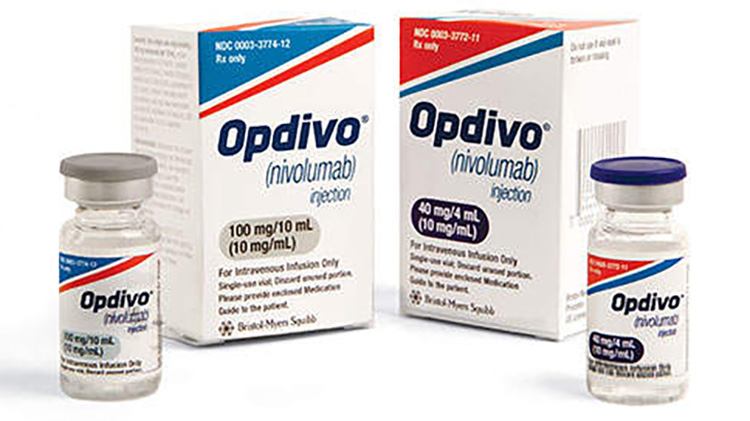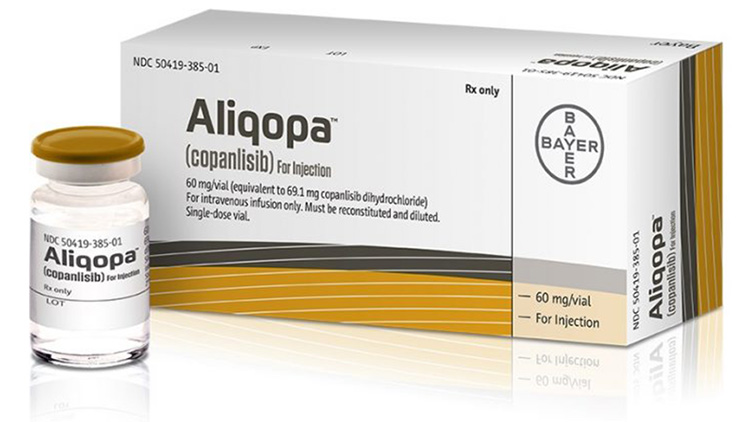Opdivo (Nivolumab) vs Aliqopa (copanlisib)
Opdivo (Nivolumab) vs Aliqopa (copanlisib)
Opdivo (nivolumab) is an immune checkpoint inhibitor specifically targeting the PD-1 pathway, used primarily to treat a variety of cancers, including melanoma, lung cancer, and kidney cancer, by enhancing the body's immune response against cancer cells. Aliqopa (copanlisib) is a PI3K inhibitor that is used for the treatment of adult patients with relapsed follicular lymphoma, working by inhibiting a pathway that is often overactive in cancer cells, thereby reducing cell proliferation and survival. When deciding between these two medications, it is essential to consider the type of cancer being treated, as their indications and mechanisms of action differ significantly; a healthcare provider can offer guidance based on the specific medical history and cancer diagnosis.
Difference between Opdivo and Aliqopa
| Metric | Opdivo (Nivolumab) | Aliqopa (copanlisib) |
|---|---|---|
| Generic name | Nivolumab | Copanlisib |
| Indications | Various types of cancers, including melanoma, lung cancer, kidney cancer, bladder cancer, head and neck cancer, and Hodgkin lymphoma | Follicular lymphoma |
| Mechanism of action | PD-1 inhibitor, enhances T-cell response against cancer cells | PI3K inhibitor, inhibits tumor cell growth and survival |
| Brand names | Opdivo | Aliqopa |
| Administrative route | Intravenous infusion | Intravenous infusion |
| Side effects | Fatigue, rash, musculoskeletal pain, pruritus, diarrhea, nausea, weakness, cough, dyspnea, constipation, decreased appetite, back pain, fever, headache, abdominal pain | Hyperglycemia, hypertension, fatigue, neutropenia, diarrhea, leukopenia, anemia, thrombocytopenia, rash, increased alanine aminotransferase, increased aspartate aminotransferase |
| Contraindications | None known | Severe hypersensitivity to copanlisib |
| Drug class | Monoclonal antibody, Immune checkpoint inhibitor | Small molecule kinase inhibitor |
| Manufacturer | Bristol-Myers Squibb | Bayer |
Efficacy
Efficacy of Opdivo (Nivolumab) in Lymphoma
Opdivo (Nivolumab) is a programmed death receptor-1 (PD-1) blocking antibody indicated for the treatment of certain types of lymphoma, including classical Hodgkin lymphoma (cHL) after relapse or after failure of autologous hematopoietic stem cell transplantation (HSCT). Clinical trials have demonstrated that Nivolumab can induce a response in a significant proportion of these patients. The efficacy of Nivolumab was evaluated in a pivotal phase II study, which showed an overall response rate (ORR) in patients with relapsed or refractory cHL. The durability of response varied among patients, with some achieving a sustained response, indicating that Nivolumab can be an effective option for this patient population.
Efficacy of Opdivo (Nivolumab) in Other Lymphoma Subtypes
While the primary indication for Nivolumab in lymphoma is for cHL, studies are ongoing to evaluate its efficacy in other lymphoma subtypes. The use of Nivolumab in non-Hodgkin lymphoma (NHL) is an area of active research, with clinical trials investigating its role as both a single agent and in combination with other therapies. However, the efficacy of Nivolumab in NHL subtypes other than cHL is not yet fully established, and its use in these contexts remains investigational.
Efficacy of Aliqopa (Copanlisib) in Lymphoma
Aliqopa (Copanlisib) is a kinase inhibitor approved for the treatment of adult patients with relapsed follicular lymphoma (FL) who have received at least two prior systemic therapies. The approval of Copanlisib was based on a single-arm clinical trial that demonstrated an ORR in a majority of patients with relapsed FL. The median duration of response was also reported, showing that the response to Copanlisib can be durable in some patients. These results suggest that Copanlisib is an effective treatment option for patients with relapsed FL who have limited therapeutic options.
Considerations for Use of Opdivo and Aliqopa
When considering the use of Opdivo (Nivolumab) or Aliqopa (Copanlisib) for the treatment of lymphoma, it is important to evaluate each patient's individual clinical scenario. Factors such as prior treatments, lymphoma subtype, and the presence of comorbid conditions can influence the decision to use these agents. Additionally, the potential side effects and the need for regular monitoring should be discussed with the patient. As with any therapy, the decision to use Opdivo or Aliqopa should be made in the context of a multidisciplinary team approach, with input from the treating oncologist, pharmacists, and other healthcare professionals involved in the patient's care.
Regulatory Agency Approvals
Opdivo
-
European Medical Agency (EMA), European Union

-
Food and Drug Administration (FDA), USA

-
Health Canada

-
Pharmaceuticals and Medical Devices Agency (PMDA), Japan

-
Therapeutic Goods Administration (TGA), Australia

-
Medsafe (NZ)

Aliqopa
-
Food and Drug Administration (FDA), USA

Access Opdivo or Aliqopa today
If Opdivo or Aliqopa are not approved or available in your country (e.g. due to supply issues), you can access them via Everyone.org.
How it works

Make an enquiry
Choose the medicine you want to buy, answer a couple of questions, and upload your prescription to speed things up. We’ll get back to you within 24 hours.


Make an enquiry
Choose the medicine you want to buy, answer a couple of questions, and upload your prescription to speed things up. We’ll get back to you within 24 hours.


Breeze through the paperwork
We'll guide you through the required documents for importing unapproved medicine, ensuring you have all the necessary information.


Get a personalized quote
We’ll prepare a quote for you, including medicine costs and any shipping, administrative, or import fees that may apply.


Receive your medicine
Accept the quote and we’ll handle the rest - sourcing and safely delivering your medicine.

Some text on this page has been automatically generated. Speak to your physician before you start a new treatment or medication.
Let's talk
If you have any questions, call us or send us a message through WhatsApp or email:
Contact us




